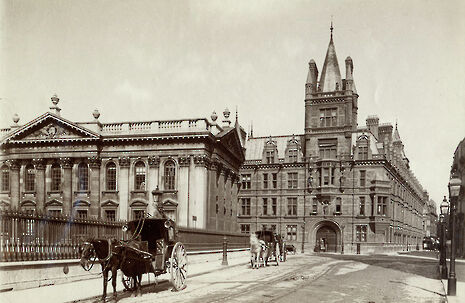Breaking into the boys’ club of Cambridge
Holly Platt-Higgins explores the historical dominance of men in Cambridge

So, I made the decision, which people seem to enjoy referring to as a ‘bold’ or ‘brave’ choice, to take two dissertations in my final year. Now, as I approach the end of my penultimate term I can safely say, without a shadow of a doubt, I very much regret this decision. Do not do it. My second dissertation is on water in Virginia Woolf.
While staring out of the English faculty window and wondering why my mother didn’t bother to make to become some child star, like Maddy from Dance Moms, so I could have avoided this horrible fate, I suddenly thought about how strange it was that 150 years ago I wouldn’t have been allowed to be here at all; a realisation quite clearly prompted by my recent reading of A Room of One’s Own.
After a quick trek through google I came to realise that, even more bizarrely, it has only been 72 years since the women studying at Cambridge were permitted status as ‘full members’ and just 25 years since women were allowed to study at Magdalene College, which is almost within our lifetimes.
“While men are wandering on the beaten track, we’re still paving the way”
Once you notice how male-dominated this place once was, you begin to wonder about how this historically male presence has left its mark in the most seemingly insignificant ways: you start questioning how much of the handwriting you see in library books might be a man’s, or how most of the inhabitants of your room before you must have been men. And how all of the stone steps, which you see worn down at the entrances to colleges and libraries, with that gentle dip in the middle, must have been worn down mostly by men’s shoes.
So, does Cambridge still feel like a boy’s club? Does it matter that we women haven’t been making a mark in this place for very long? Well, I think I should preface my answer with an acknowledgement of my bias – no, not because I’m a woman - because I’m at a college which one of the highest discrepancies between their male and female admissions ratio. Churchill does sometimes feel like a boy’s club purely because you don’t see many women around.
But, even outside college, there seems to be an air of invisibility regarding the women of Cambridge. From my first couple of years, the people I remember seeing but not knowing, were men. It seems men are just more visible than women when Cambridge is the backdrop. But why is the case?
To start with, we’re relatively new to a lot of the spaces in Cambridge. Only last year were women allowed the opportunity to be in The Pitt Club, (not that that’s much of a brag, but an opportunity, nonetheless) and in the whole history of Cambridge, there have only been four female student union presidents.
Beyond our novelty seem also to be held back by the lack of effort made to recognise female achievement. Take sport for instance, there is the constant condescension that ‘no one watches the women’s’ games because women are boring or can’t play properly, and yet the girls won the boat race, the skiing and the Varsity rugby match last year, which can’t exactly be said for the boys. Yet you are far more likely to know the names of male blues than female blues.
And even now, there are still cases of incredibly outdated sexism and sexually inappropriate behaviour towards women happening throughout the university; from drinking societies to educators in senior positions. It’s difficult to discuss women’s issues without people instantly dismissing you because they’ve either heard it all before or because it’s an array of man-hating lies. Nevertheless, one thing that I think can be said is that, it undoubtedly takes a whole lot more confidence for a woman to step forward and go for something in Cambridge. Whether it’s a first or a blue or a CUSU position, it takes a lot more courage for a woman to nominate themselves, because it’s new territory for us.
The history of male dominance in Cambridge means that female, is not the norm, and so while men are wandering on the beaten track, we’re still in the process of paving the way. And while there are an array of incredible and talented women already trying to do this, we should all be working to create space for the women of Cambridge. And surely it is pointless to continue within the entrenched system of Cambridge as a boys’ club when there is so much to be gained from the student body creating space and harbouring the talent of everyone at the university?
Woolf wrote that, ‘All this pitting of sex against sex, of quality against quality; all this claiming of superiority and imputing of inferiority’ was an attitude which belonged ‘to the private-school stage of human existence.’ So, as university students, perhaps we ought to make more of an effort to move beyond the infantilized and unproductive outlook of boy vs girls.
 News / Judge Business School advisor resigns over Epstein and Andrew links18 February 2026
News / Judge Business School advisor resigns over Epstein and Andrew links18 February 2026 News / Hundreds of Cambridge academics demand vote on fate of vet course20 February 2026
News / Hundreds of Cambridge academics demand vote on fate of vet course20 February 2026 News / Petition demands University reverse decision on vegan menu20 February 2026
News / Petition demands University reverse decision on vegan menu20 February 2026 News / CUCA members attend Reform rally in London20 February 2026
News / CUCA members attend Reform rally in London20 February 2026 News / Gov grants £36m to Cambridge supercomputer17 February 2026
News / Gov grants £36m to Cambridge supercomputer17 February 2026










